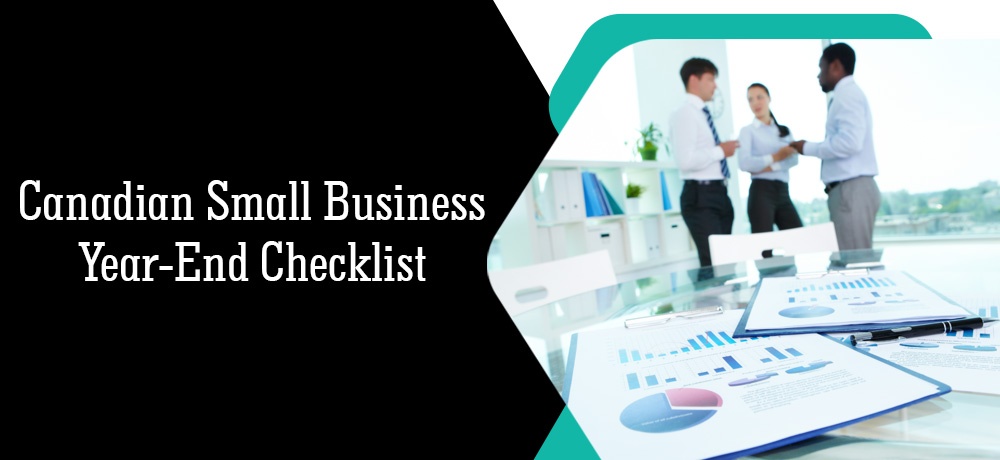Canadian Small Business Year-End Checklist

Most small businesses can choose when they would like their business year to end. For example, seasonal businesses may choose the month their season ends as their year’s end. Many businesses, however, keep their business year-end in line with the calendar year.
Well, the experts at Essina Business Financial Services have listed some tips to help ensure a smooth year-end process with your accountant:
For an incorporated company
How your business is registered depends on how your accountant files your taxes. Whether your business is self-employed or incorporated, each has its benefits and drawbacks. Talk to your accountant if you are not sure what is best for you and your business.
Here’s what you need to get:
1. Electronic copies of your bookkeeping data
A complete and accurate set of your company’s financial records. This should include all bank statements, credit card statements, invoices, and receipts.
2. Business bank and credit card statements for the year
This information can be used to track spending, monitor cash flow, and detect any fraudulent activity that may have occurred. Additionally, this information can be used to prepare financial statements and tax returns.
3. Receipts, bills, and deposit info for the year
Receipts, bills and deposit information can be used to keep track of your spending and income for the year. It can help you budget for the future and make informed financial decisions.
4. Payroll records (If you have employees)
These records are used to calculate an employee’s wages and taxes. Payroll records also help you track employee hours worked and vacation time.
5. Purchases or sales of assets (Bill of sales for equipment, vehicles, buildings, or land)
Purchases or sales of assets may be necessary to document the change in ownership of these items. A bill of sale can provide proof of ownership and can help avoid disputes later on.
6. Is it a home-based business?
Provide details about using your home for business purposes. This is to ensure that your home business operates within the law. And also to determine if you are eligible for tax deductions or rebates.
7. Do you use your personal vehicle for business? (Business mileage log for each)
Business mileage logs are used to document the business use of a vehicle. This is important for tax purposes, as businesses can deduct the cost of operating a vehicle for business purposes.
For a sole proprietor
Sole Proprietorship, in addition to the above, accountants will require all of your personal information.
Here’s what you need to get:
1. T4 slips (Any additional employment income slips)
The T4 slip provides information on the total income earned during the year, as well as any deductions or credits that may be available.
2. T4A slips
T4A Slips are needed for year-end to provide information about any amounts paid to a contractor or subcontractor for services rendered.
3. T3 slips for income from trusts
Sole proprietors need to file T3 slips for their trusts in order to declare their income for the year. This is necessary to calculate their taxes owing and to ensure that they comply with the Income Tax Act.
4. T5 slips for investment income
A sole proprietor needs to file a T5 slip for each investment they have in order to report any income or losses from those investments on their income tax return.
5. RRSP contributions
By contributing to an RRSP, you can reduce your taxable income for the year, leading to a lower overall tax bill.
6. Donation receipts
Donation receipts are needed for year-end tax purposes because they provide documentation of the donations made by the sole proprietor. This documentation is important for tax purposes and for tracking donations made by the sole proprietor.
7. Medical receipts
Medical receipts can provide you with a deduction on your personal income taxes.
8. Childcare expenses
Including childcare expenses in year-end accounting can provide you with a deduction on your personal income taxes.
We recommend that you start preparing for your year-end accounting well in advance. This way, you can stay calm and stay caught up in your bookkeeping.
If you need assistance getting your bookkeeping records in order, we at Essina Business Financial Services can help. We can also put you in touch with one of our highly recommended accountants. We serve clients across Alberta, including Edmonton, Sherwood Park, Spruce Grove, Leduc, and Camrose.
Get in touch with us today!
To learn more about the services we offer, please click here. To get in touch with us, please click here or call us at (780) 217-7834 or email us at info@essina.ca.